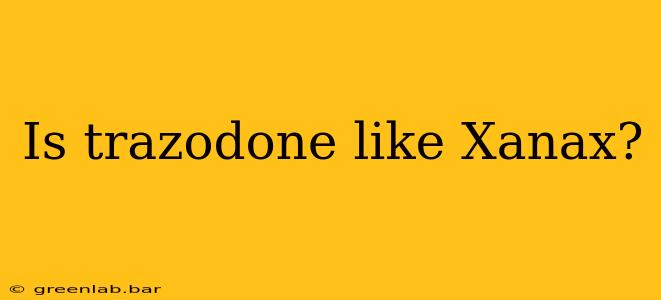Is Trazodone Like Xanax? Understanding Key Differences and Similarities
Trazodone and Xanax, while both used to treat aspects of anxiety and sleep problems, are vastly different medications with distinct mechanisms of action, side effects, and uses. Understanding these differences is crucial for anyone considering either medication. This article will explore the similarities and, more importantly, the significant distinctions between Trazodone and Xanax.
What is Trazodone?
Trazodone is primarily an antidepressant classified as a serotonin antagonist and reuptake inhibitor (SARI). While its primary use is treating major depressive disorder (MDD), it's also frequently prescribed off-label for its sedative effects to improve sleep. It works by affecting serotonin levels in the brain, a neurotransmitter crucial for mood regulation and sleep.
What is Xanax?
Xanax (alprazolam) is a benzodiazepine, a class of drugs known for their potent anxiolytic (anxiety-reducing) and sedative-hypnotic (sleep-inducing) effects. It's primarily used for treating anxiety disorders like generalized anxiety disorder (GAD), panic disorder, and social anxiety disorder. It works by enhancing the effects of gamma-aminobutyric acid (GABA), a neurotransmitter that inhibits brain activity, leading to a calming effect.
Key Differences:
| Feature | Trazodone | Xanax (Alprazolam) |
|---|---|---|
| Drug Class | Serotonin antagonist and reuptake inhibitor (SARI) | Benzodiazepine |
| Primary Use | Depression, Insomnia (off-label) | Anxiety disorders, Panic attacks, Insomnia |
| Mechanism of Action | Affects serotonin levels | Enhances GABA activity |
| Addiction Potential | Low | High |
| Withdrawal Symptoms | Generally mild | Can be severe and potentially dangerous |
| Sedation | Significant, often a primary reason for use | Significant, can be a major side effect |
| Cognitive Effects | Less pronounced cognitive impairment | Can cause significant cognitive impairment, including drowsiness, confusion, and memory problems |
Similarities:
Both Trazodone and Xanax can induce drowsiness and are sometimes used to aid with sleep. However, this is where the similarities largely end. Their mechanisms of action, therapeutic targets, and potential side effects differ significantly.
Important Considerations:
- Addiction: Xanax carries a significantly higher risk of addiction and dependence than Trazodone. Benzodiazepines should only be used for short periods under strict medical supervision.
- Withdrawal: Xanax withdrawal can be dangerous and should only be managed under the guidance of a healthcare professional. Gradual tapering is crucial to avoid severe symptoms. Trazodone withdrawal is generally milder.
- Cognitive Impairment: Xanax can cause more pronounced cognitive side effects compared to Trazodone.
- Interactions: Both medications can interact with other drugs, so it's essential to inform your doctor about all medications you are taking.
Conclusion:
Trazodone and Xanax are not interchangeable. While both can cause drowsiness and are sometimes used for sleep difficulties, they address different underlying conditions through distinct mechanisms. Xanax is a potent anxiolytic with a high potential for addiction and severe withdrawal symptoms, while Trazodone is primarily an antidepressant used off-label for sleep. Always consult with a healthcare professional before starting or stopping any medication. They can help determine the most appropriate treatment based on your individual needs and medical history. Self-medicating can be dangerous and should be avoided.

